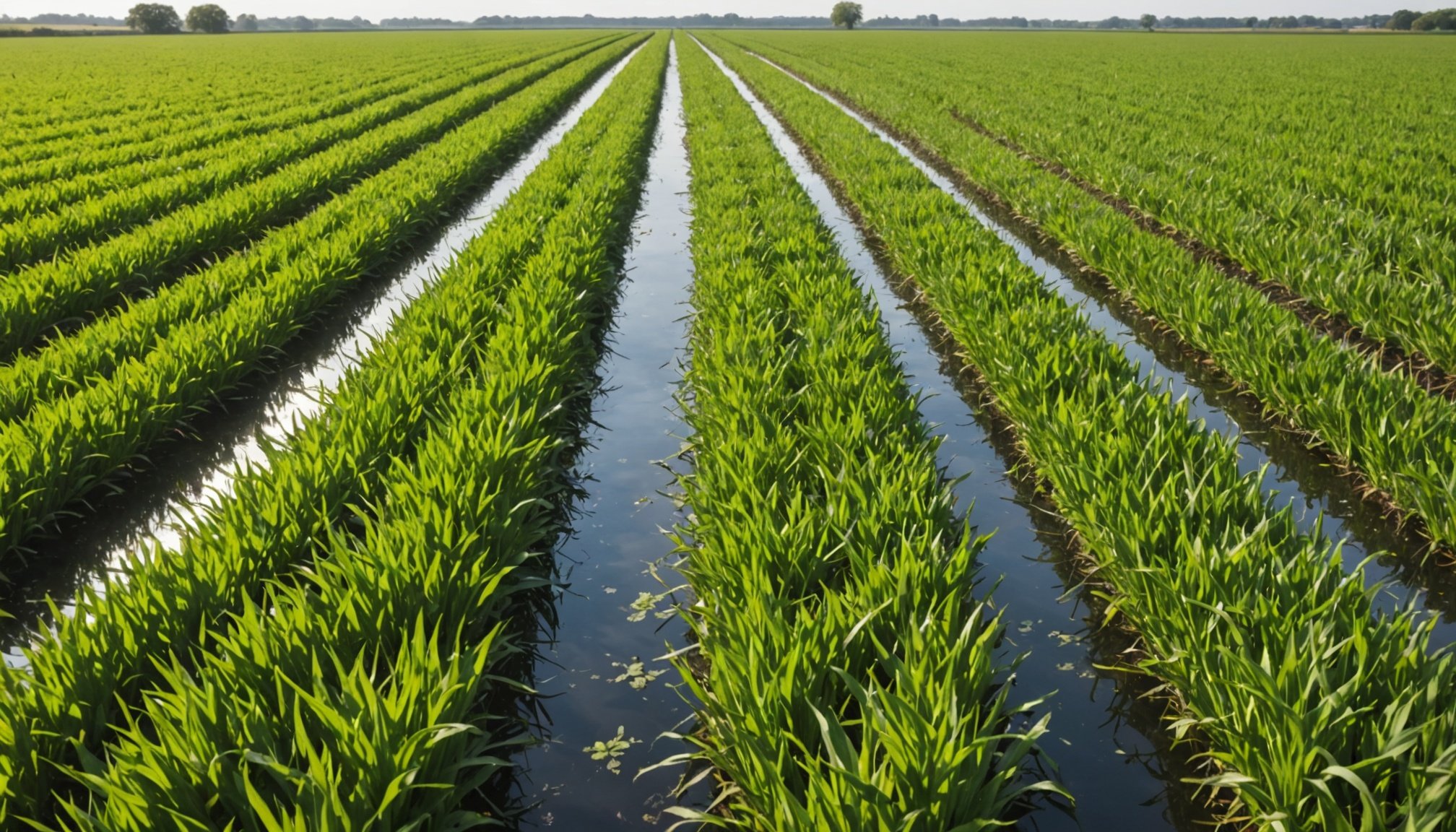Revolutionary Strategies for Eco-Friendly Water Management in UK Agriculture: Paving the Way for a Sustainable Future
The Imperative of Sustainable Water Management in Agriculture
Water is the lifeblood of agriculture, but its management has become a critical concern in the face of climate change, increasing food demand, and environmental sustainability. The UK, like many other countries, is grappling with the challenges of ensuring sufficient, clean water for agricultural use while minimizing the impact on the environment. This article delves into the revolutionary strategies being adopted in UK agriculture to manage water sustainably, paving the way for a more resilient and environmentally friendly farming sector.
The Role of Research and University Collaborations
Research institutions and universities are at the forefront of developing innovative solutions for sustainable water management in agriculture. For instance, the Royal Agricultural University is hosting an event focused on how water catchment management and sustainable farming practices can enhance water quality. This event features presentations from industry experts, such as Jenny Phelps from the Farming and Wildlife Advisory Group (FWAG) and Kiran Tota-Maharaj from the Royal Agricultural University, highlighting industry-led projects that are making a significant impact on water quality[1].
Also read : Key considerations for uk beauty brands to embrace eco-friendly packaging solutions
Smart Irrigation Systems: A Game-Changer for Water Efficiency
Smart irrigation systems are revolutionizing water management in agriculture by leveraging advanced technologies such as sensor technology, data analytics, and IoT. These systems can reduce water usage by up to 50% compared to traditional methods, making them a crucial tool for sustainable farming practices.
Benefits of Smart Irrigation Systems
- Water Conservation: By applying water only when and where it’s needed, smart systems significantly reduce water waste and conserve this precious resource.
- Increased Crop Yields: Precision irrigation ensures that crops receive optimal moisture levels, leading to healthier plants and higher yields.
- Cost Savings: Reduced water and energy consumption translate to lower operational costs for farmers.
- Environmental Sustainability: Efficient water use helps preserve aquifers and reduces the environmental impact of agriculture.
- Improved Crop Quality: Consistent and appropriate irrigation can enhance the quality and uniformity of crops[3].
Case Studies in Smart Irrigation Success
- California Almond Orchards: Implementation of precision irrigation techniques has reduced water use by 20% while maintaining or increasing yields.
- Australian Cotton Farms: Smart irrigation systems have helped farmers in water-scarce regions improve water use efficiency by up to 40%.
- Indian Sugarcane Plantations: Adoption of drip irrigation and smart scheduling has led to water savings of 30-50% and yield increases of 15-25%[3].
Vertical Farming: The Future of Water-Efficient Agriculture
Vertical farming, or controlled environment agriculture (CEA), is another innovative approach to sustainable water management. This method involves growing crops in vertically stacked layers, often in indoor environments, which can significantly reduce water use.
Also to see : Elevate your advertising expertise with programmatic certification
Water Efficiency in Vertical Farming
A notable example is the GigaFarm project in New York, powered by UK technology from Intelligent Growth Solutions (IGS). This facility will be up to 98% water efficient, utilizing renewable technologies such as biogas digesters, gasifiers, solar PV, and LED grow lights. The project aims to produce three million kilos of fresh produce annually, with minimal water and energy consumption[2].
Economic and Environmental Considerations
While vertical farming offers numerous benefits, including reduced water use and increased crop yields, it also comes with significant energy costs. For instance, producing one kilogram of lettuce in a vertical farm can require around 12.5 kWh of energy, primarily for lighting. However, as renewable energy sources become more prevalent, the carbon footprint of vertical farming is expected to decrease, making it a more sustainable option[4].
Policy and Incentives: Driving Sustainable Practices
Government policies and incentives play a crucial role in promoting the adoption of sustainable water management practices in agriculture.
Key Policy Areas
- Subsidies for Smart Irrigation Equipment: Financial support for farmers to invest in smart irrigation systems.
- Tax Incentives for Water Conservation: Tax breaks for farmers who implement water-saving technologies.
- Research Funding: Funding for research into new agricultural water management technologies.
- Regulations on Water Use: Policies regulating water abstraction and use to ensure sustainable practices.
- Education and Training Programs: Programs to educate farmers on the benefits and implementation of sustainable water management practices[3].
Circular Economy and Regenerative Agriculture: Long-Term Solutions
The concept of a circular economy and regenerative agriculture is gaining traction as a long-term solution for sustainable water management.
Circular Economy in Agriculture
The circular economy approach in agriculture focuses on minimizing waste and maximizing the use of resources. For example, the GigaFarm project integrates a Food-Energy-Waste (FEW) system, which eliminates a significant portion of the energy costs associated with food production. This approach ensures that resources are used efficiently and waste is minimized, contributing to a more sustainable agricultural sector[2].
Regenerative Agriculture Practices
Regenerative agriculture practices aim to improve soil health, biodiversity, and ecosystem services. These practices include no-till or reduced-till farming, cover cropping, and integrating organic amendments into the soil. By enhancing soil health, regenerative agriculture can improve water retention and reduce the need for irrigation, making farming more resilient to climate change.
Impact on Rural Communities and the Agricultural Sector
Sustainable water management practices have a profound impact on rural communities and the broader agricultural sector.
Economic Benefits
- Increased Efficiency: Smart irrigation systems and vertical farming reduce operational costs and improve crop yields, leading to higher profits for farmers.
- Job Creation: The adoption of new technologies and practices can create new job opportunities in rural areas, contributing to local economic growth.
Environmental Benefits
- Water Conservation: Efficient water use helps preserve aquifers and reduces the environmental impact of agriculture.
- Soil Health: Regenerative agriculture practices improve soil health, reducing erosion and increasing water retention.
Social Benefits
- Food Security: Sustainable water management ensures consistent and high-quality food production, enhancing food security.
- Community Engagement: Educational programs and workshops on sustainable practices can engage rural communities in the transition towards more sustainable farming methods.
Practical Insights and Actionable Advice
For farmers and policymakers looking to adopt sustainable water management practices, here are some practical insights and actionable advice:
Implement Smart Irrigation Systems
- Conduct a Water Audit: Assess your current water use to identify areas of inefficiency.
- Invest in Sensor Technology: Use sensors to monitor soil moisture and weather conditions to optimize irrigation.
- Train Your Staff: Educate your team on the benefits and operation of smart irrigation systems.
Explore Vertical Farming
- Assess Energy Costs: Evaluate the energy requirements and potential savings of vertical farming.
- Choose the Right Crops: Select crops that are well-suited to vertical farming, such as leafy greens and herbs.
- Integrate Renewable Energy: Use renewable energy sources to power your vertical farm.
Adopt Regenerative Agriculture Practices
- Start Small: Begin with a small plot to test regenerative practices before scaling up.
- Monitor Soil Health: Regularly test your soil to assess its health and adjust your practices accordingly.
- Engage with Local Communities: Share your experiences and learn from other farmers in your community.: A Water-Smart Future for UK Agriculture
As the UK agricultural sector navigates the challenges of climate change, water scarcity, and environmental sustainability, revolutionary strategies such as smart irrigation systems, vertical farming, and regenerative agriculture are emerging as key solutions. These approaches not only reduce water use and improve crop yields but also contribute to a more resilient and sustainable agricultural sector.
A Future Built on Data and Technology
The future of agriculture is increasingly data-driven and technologically advanced. By leveraging smart farming technologies, farmers can make informed decisions in real-time, adapting to changing conditions and optimizing resource use.
A Commitment to Sustainability
“Sustainable agriculture is not just about reducing our impact on the environment; it’s about creating a system that is resilient, productive, and beneficial for both people and the planet,” says Jenny Phelps from FWAG. As we continue to innovate and refine these technologies, the future of UK agriculture looks increasingly water-smart, sustainable, and promising.
Table: Comparative Analysis of Traditional and Smart Irrigation Systems
| Feature | Traditional Irrigation | Smart Irrigation Systems |
|---|---|---|
| Water Use Efficiency | Low | High |
| Crop Yields | Variable | Optimized |
| Energy Consumption | High | Low |
| Operational Costs | High | Low |
| Environmental Impact | High | Low |
| Precision | Low | High |
| Real-Time Monitoring | No | Yes |
| Automation | Manual | Automated |
Quotes from Experts
- “Smart irrigation systems can reduce water usage in agriculture by up to 50% compared to traditional methods.” – Farmonaut[3]
- “The circular economy approach in agriculture ensures that resources are used efficiently and waste is minimized, contributing to a more sustainable agricultural sector.” – Intelligent Growth Solutions[2]
- “Regenerative agriculture practices aim to improve soil health, biodiversity, and ecosystem services, making farming more resilient to climate change.” – Royal Agricultural University[1]
By embracing these revolutionary strategies, the UK agricultural sector can ensure a more sustainable, productive, and water-smart future, meeting the needs of both people and the planet.











